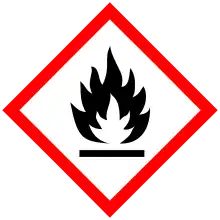 | |
| Names | |
|---|---|
Other names
| |
| Identifiers | |
3D model (JSmol) |
|
| 605260 | |
| ChEBI | |
| ChEMBL | |
| ChemSpider | |
| ECHA InfoCard | 100.000.784 |
| EC Number |
|
| KEGG | |
PubChem CID |
|
| UNII | |
| UN number | 2402 |
CompTox Dashboard (EPA) |
|
| |
| |
| Properties | |
| C3H8S | |
| Molar mass | 76.16 g·mol−1 |
| Density | 0.8143 |
| Melting point | −130.7 °C (−203.3 °F; 142.5 K) |
| Boiling point | 52.5 °C (126.5 °F; 325.6 K) |
| 4835 g/L | |
| Vapor pressure | 277.3 mm Hg |
| Hazards | |
| GHS labelling:[1] | |
   | |
| Danger | |
| H225, H302, H315, H319, H331 | |
| P210, P233, P240, P241, P242, P243, P261, P264, P264+P265, P270, P271, P280, P301+P317, P302+P352, P303+P361+P353, P304+P340, P305+P351+P338, P316, P321, P330, P332+P317, P337+P317, P362+P364, P370+P378, P403+P233, P403+P235, P405, P501 | |
| Related compounds | |
Related compounds |
Propanethiol |
Except where otherwise noted, data are given for materials in their standard state (at 25 °C [77 °F], 100 kPa).
Infobox references | |
Isopropyl mercaptan is an organic compound with the formula C3H8S. It has the CAS Registry Number 75-33-2.[2] It is REACH registered with the European number of 200-861-4.[3] It is a water-white liquid with an extremely pungent odor resembling skunk spray or bad eggs. The odor means one use is as an odorizer.[4] Despite this, it has Food and Drug Administration sanction as a food additive to add flavor.[5] Another use is as a rubber additive.[6]
Analysis and detection
The usual method of analysis and detection is by gas chromatography.[7][8]
See also
References
- ↑ "2-Propanethiol". pubchem.ncbi.nlm.nih.gov.
- ↑ "CAS Common Chemistry". commonchemistry.cas.org. Retrieved 2023-09-15.
- ↑ PubChem. "2-Propanethiol". pubchem.ncbi.nlm.nih.gov. Retrieved 2023-09-15.
- ↑ Michanowicz, Drew R.; Leventhal, Olivia M.; Domen, Jeremy K.; Williams, Samuel R.; Lebel, Eric D.; Hill, Lee Ann L.; Buonocore, Jonathan J.; Nordgaard, Curtis L.; Bernstein, Aaron S.; Shonkoff, Seth B.C. (2023-07-25). "Natural gas odorants: A scoping review of health effects". Current Environmental Health Reports. 10 (3): 337–352. doi:10.1007/s40572-023-00403-w. ISSN 2196-5412. PMC 10504204. PMID 37491689. S2CID 260163457.
- ↑ PubChem. "2-Propanethiol Flavor profile". pubchem.ncbi.nlm.nih.gov. Retrieved 2023-09-15.
- ↑ Li, Zhiwei; An, Dong; He, Rizheng; Sun, Zhijian; Li, Jiaxiong; Zhang, Zhiyi; Liu, Yaqing; Wong, Chingping (April 2023). "The design of crosslinks in different vulcanized systems to improve crack growth resistance for carbon black/graphene oxide/natural rubber composites". Advanced Composites and Hybrid Materials. 6 (2). doi:10.1007/s42114-023-00662-z. ISSN 2522-0128. S2CID 258137193.
- ↑ Tangerman, Albert (1986-01-01). "Determination of volatile sulphur compounds in air at the parts per trillion level by tenax trapping and gas chromatography". Journal of Chromatography A. 366: 205–216. doi:10.1016/S0021-9673(01)93468-5. ISSN 0021-9673. PMID 3782318.
- ↑ Wang, Xinguang; Le, Minh; Stuetz, Richard (January 2022). "Calibration methods for VSCs measured on AS-TD-GC-SCD". Environmental Monitoring and Assessment. 194 (1): 25. doi:10.1007/s10661-021-09690-y. ISSN 0167-6369. PMID 34905118. S2CID 245134350.
This article is issued from Wikipedia. The text is licensed under Creative Commons - Attribution - Sharealike. Additional terms may apply for the media files.